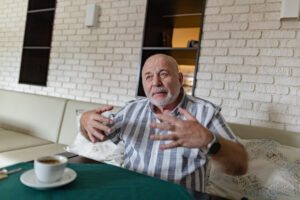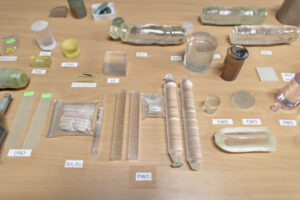On a serene Sunday morning, I engaged in an enlightening conversation with Professor Borys Grynyov, a distinguished Ukrainian physicist and a vehement advocate for the expulsion of the Joint Institute for Nuclear Research (JINR) from the European Organisation for Nuclear Research (CERN). Our discussion delved into the intricate and contentious relationship between these two scientific bodies, the potential misuse of research for military purposes, and Grynyov’s passionate campaign against this collaboration.

Professor Borys Grynyov has been a prominent figure in the field of nuclear physics for decades. He has served as the representative of Ukraine at various international scientific councils and has held significant governmental positions, including Deputy Minister of Science in Ukraine. Grynyov’s extensive experience and intimate knowledge of both JINR and CERN have positioned him as a key voice in the ongoing debate over the scientific and ethical implications of their collaboration.
CERN, founded in 1954, is one of the world’s largest and most respected centres for scientific research in particle physics. Known for its Large Hadron Collider, CERN operates under the unofficial motto of “science for peace.” It is a bastion of international scientific cooperation, with 23 member states, including the UK.
JINR, on the other hand, was established in 1956 as a Soviet response to CERN. Located in Dubna, Russia, JINR is predominantly funded by Russia, which contributes over 80% of its budget. Originally comprising members from the Warsaw Pact nations, JINR now includes several former Soviet Union states. Despite its charter forbidding the use of research for warfare, there are numerous links between JINR and the Russian military-industrial complex.
The crux of the issue lies in the continued access Russian scientists have to CERN through JINR, even after CERN voted to eject Russian and Belarusian members in response to the war in Ukraine. Grynyov has raised alarm over this access, highlighting that Russian scientists are potentially utilising CERN’s advanced research in materials, detectors, and connectors for military applications.
“Continuing collaboration of CERN with the JINR during the ongoing war allows the institutions of the Russian Federation, which partake in military programmes, to benefit from continued access to the latest technological developments,” Grynyov stated. This sentiment underscores the precarious balance between scientific collaboration and national security.
Our dialogue was a profound exploration of Grynyov’s concerns and his motivations. When asked about the specific technologies at CERN that might be misused, Grynyov elaborated on the dual-use nature of scientific advancements. “First of all, directly from these experiments, the knowledge can be used in medicine, custom control, and various industrial applications. However, these same advancements can be repurposed for military technology,” he explained.
Grynyov cited instances where research conducted at CERN was allegedly repurposed for military use by Russian entities. One notable example involved a Ukrainian scientist from Luhansk who, after working on an experiment at CERN, returned to Russia and joined a military enterprise producing drones. “This scientist, educated in Moscow and experienced at CERN, now contributes to the war effort against Ukraine,” Grynyov lamented.
The professor’s campaign against JINR’s collaboration with CERN is rooted in his belief that scientific research should serve peaceful purposes. He recounted how the war in Ukraine has profoundly affected him, both personally and professionally. “When the war began, it shattered my world. For a month, I couldn’t comprehend it. After witnessing the atrocities in Bucha, I understood the stark reality: we are living in two separate worlds,” he shared, his voice heavy with emotion.
Despite the opposition he faces, Grynyov remains resolute in his mission. He has been vocal at CERN meetings, written letters to council members, and engaged with international media to raise awareness. His ultimate goal is to see JINR sanctioned and its collaboration with CERN terminated. “It’s essential for the integrity of scientific research and the security of the democratic world,” he asserted.

Ukrainian Physicist’s Fight: The Struggle to Sever Ties Between CERN and Russian-Dominated JINR
The vote on June 20th by CERN’s international council of 23 member states has concluded, and CERN failed to terminate its cooperation with JINR. Instead, CERN sanctioned and conditioned some of JINR’s access to its scientific findings.
Grynyov expressed his disappointment and concern, noting the voting pattern: “Hungary supported JINR, while ten countries, including Germany, France, Switzerland, and Israel, abstained. Ten countries voted against JINR, but it wasn’t enough to secure a two-thirds majority.”
The March 25, 2022, public communication from CERN underscored the measures taken in response to the invasion of Ukraine. The council decided to suspend the participation of CERN scientists in all scientific committees of institutions in Russia and Belarus, cancel joint events, and halt granting contracts of association to new individuals affiliated with Russian and Belarusian institutions. Specifically, regarding JINR, the CERN Council resolved to suspend CERN scientists’ participation in JINR scientific committees and cancel joint events. They also suspended JINR’s Observer status at the Council and ceased exercising rights resulting from its Observer status at JINR.
The communication highlighted CERN’s core values and the impact of the invasion: “The unprovoked and premeditated attack on Ukraine has caused widespread loss of life and a humanitarian crisis. Therefore, the Council stressed that its decisions are taken to express its solidarity with the Ukrainian people and its commitment to science for peace.”
Despite these actions, the collaboration with JINR persists under new conditions. As per CERN’s communication on July 2, 2024: “Though located in Russia and mainly funded by it, JINR is an Intergovernmental Organization with 18 Member States. It sets its own science policy and sends its scientists and engineers to CERN using its own resources. Scientific relations between CERN and JINR date back to 1957.”

The measures include:
- Suspending the participation of CERN scientists in all JINR scientific committees.
- Cancelling all jointly arranged events between CERN and JINR.
- Not engaging in new collaborations with JINR until further notice.
- Suspending JINR’s Observer status at the CERN Council.
These decisions were driven by the imperative to prevent the misuse of scientific research for military purposes. Grynyov remains committed to his campaign, urging further sanctions and continued vigilance.
“Science and technology play pivotal roles in modern warfare. We cannot afford to provide our adversaries with the tools they need to wage war,” he warned.
Grynyov’s advocacy is a call to the international community to uphold the ethical integrity of scientific research and ensure it serves the cause of peace.
His efforts underscore the complex interplay between science, politics, and security in our increasingly interconnected world.
The debate over scientific collaboration in the context of geopolitical tensions is not new. Critics of the sanctions against JINR argue that isolating Russian and Belarusian scientists hampers international dialogue and scientific progress. However, Grynyov contends that the stakes are too high. “Science and technology play pivotal roles in modern warfare. We cannot afford to provide our adversaries with the tools they need to wage war,” he warned.
Reflecting on the historical context, Grynyov pointed out that similar measures were not taken against the Soviet Union during its invasion of Afghanistan or against the US during the Iraq War. He explained, “At the time of the Soviet invasion of Afghanistan in the late 1970s and 1980s, CERN had already been established for several decades, since 1954. However, its global influence was not as pronounced. Similarly, during the US invasion of Iraq in 2003, CERN was a significant scientific institution, but it had not yet reached the pinnacle of its global prominence. This substantial growth in influence and importance, particularly with the operational start of the Large Hadron Collider in 2008, has since transformed CERN into a pivotal player in the global scientific community.”
As our conversation drew to a close, I asked Grynyov what advice he would give to young scientists, particularly those from conflict-affected regions. “Young scientists should seek opportunities in global centres of excellence. They should work for the betterment of humanity and avoid becoming tools of war,” he advised. His words were a poignant reminder of the moral responsibilities that come with scientific inquiry.
Professor Borys Grynyov’s campaign is more than a fight against the misuse of scientific research; it is a stand for ethical integrity and the preservation of peace. His efforts underscore the complex interplay between science, politics, and security in our increasingly interconnected world.

CERN’s Dilemma: Collaboration or Complicity?
After my enlightening conversation with Professor Grynyov, I turned my attention to CERN, seeking clarity on their position regarding the contentious collaboration with the Joint Institute for Nuclear Research (JINR). I reached out to the CERN press office, hoping to glean insights that might shed light on the institution’s stance amid growing concerns about the potential military exploitation of scientific research.
CERN’s response, conveyed by press officer Anais Gerard, was measured and resolute.
Gerard reiterated CERN’s unwavering commitment to peaceful collaboration and fundamental research in particle physics, underscoring that there is no military dimension to its activities. She detailed the significant measures CERN has implemented since the onset of the war in Ukraine: the suspension of CERN scientists’ participation in Russian and Belarusian scientific committees, the termination of joint events, and the cessation of new contracts of association with individuals from these nations. Furthermore, she emphasised that CERN has decided to end all cooperation agreements with Russia and Belarus by the close of 2024. This decision, she explained, is a testament to CERN’s solidarity with the Ukrainian people and its dedication to the principle of science for peace.
Despite the thoroughness of Gerard’s response, there were notable omissions. CERN did not address specific inquiries about the safeguards in place to ensure that its research is not repurposed for military use by JINR scientists, particularly given the dual-use potential of many scientific advancements. Moreover, there was a conspicuous lack of clarity on how CERN navigates the influence of political considerations over ethical and security issues within its member states. Crucially, the response did not engage directly with Professor Grynyov’s campaign or the specific allegations he has raised about the misuse of research. This gap in the narrative appears to echo Grynyov’s concerns: that the existing measures may not be sufficiently robust to prevent the military exploitation of CERN’s research by Russian scientists affiliated with JINR.
The silence on these pivotal points is telling. It suggests a potential underestimation of the gravity of the issue Grynyov has tirelessly highlighted. The ongoing access that JINR scientists have to CERN’s research remains a critical point of contention, one that Grynyov argues could have dire consequences for Ukraine’s national security.
In parallel with my communication with CERN, I also reached out to JINR for their perspective. As of this writing, there has been no response from the Joint Institute for Nuclear Research, leaving an essential part of this intricate puzzle unaddressed.
The interplay between science, politics, and ethics remains fraught with complexities. Grynyov’s campaign, grounded in a deep concern for the ethical integrity of scientific research, continues to raise critical questions about the responsibilities of international scientific institutions in times of geopolitical strife. The detailed yet incomplete response from CERN underscores the necessity for ongoing scrutiny and dialogue to ensure that the noble pursuit of scientific knowledge does not inadvertently fuel the engines of war.
Vudi Xhymshiti, founder and chief editor of The Frontliner Magazine, brings a wealth of experience in reporting on global armed conflicts and political issues. With a background in Documentary Photography and Photojournalism from the University of the Arts London, and studies in Political Science, International Relations, and Diplomacy, Vudi skilfully merges human rights insights with dedicated journalism. His ethical and thoughtful reporting has graced top publications like The Guardian and The New York Times. At The Frontliner, launched in 2023, he explores the profound effects of conflicts on law, human rights, and freedoms, continuing his commitment to impactful storytelling.


